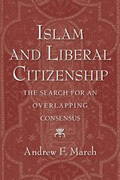
Islam and liberal citizenship: the search for an overlapping consensus
March, Andrew F.
Some argue that Muslims have no tradition of separation of church and state and therefore can't participate in secular, pluralist society. At the other extreme, some Muslims argue that it is the duty of all believers to resist Western forms of government and to impose Islamic law. In Islam and Liberal Citizenship, Andrew F. March is seeking to find a middle way between these poles. Howcan Muslims be both good citizens of liberal democracies and good Muslims? This is among the most pressing questions of our time, particularly in contemporary Europe. Some argue that Muslims have no tradition of separation of church and state and therefore can't participate in secular, pluralist society. At the other extreme, some Muslims argue that it is the duty of all believers to resist Western forms of government and to impose Islamic law. Andrew F. March isseeking to finda middle way between these poles. Is there, he asks, a tradition that is bothconsistent with orthodox Sunni Islam that is also compatible with modern liberal democracy? He begins with Rawls's theory that liberal societies rely for stability on an ''overlapping consensus'' between a publicconception of justice and popular religious doctrines and asks what kinds of demands liberal societies place on citizens, and particularly on Muslims. March then offers a thorough examination of Islamic sources and current trends in Islamic thought to see whether there can indeed be a consensus. March finds that the answer is an emphatic ''yes.'' He demonstrates that there are very strong and authentically Islamic arguments for accepting the demands of citizenship in a liberal democracy, manyof them found even in medieval works of Islamic jurisprudence. In fact, he shows, it is precisely the fact that Rawlsian political liberalism makes no claims to metaphysical truth that makes it appealing to Muslims. Introduction: Moral Conflict, Political Liberalism, and Islamic EthicsPart I: Justificatory Comparative Political Theory: The Search for Overlapping Consensus through ''Conjecture,''1. Purposes: The Place of Justificatory Comparative Political Theory2. Methods: The Ethics of Comparative EthicsPart II: Islam and Liberal Citizenship: Patterns of Moral Disagreement and Principled Reconciliation3. Islamic Objections to Citizenship in Non-Muslim Liberal Democracies4. Identifying Equilibrium: An Ideal-Typical Islamic Doctrine of CitizenshipPart III: Islamic Affirmations of Liberal Citizenship5. Residence in a Non-Muslim State6. Loyalty to a Non-Muslim State7. Recognition of Non-Muslims and Moral Pluralism8. Solidarity with Non-MuslimsConclusion: Tradition and Creativity in Grounding Moral Obligation to Non-MuslimsNotesBibliographyIndex
- ISBN: 978-0-19-983858-5
- Editorial: Oxford University
- Encuadernacion: Rústica
- Páginas: 360
- Fecha Publicación: 07/07/2011
- Nº Volúmenes: 1
- Idioma: Inglés
